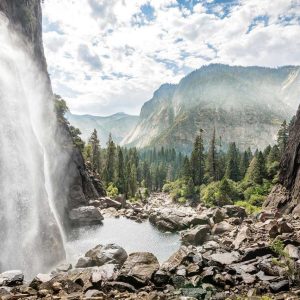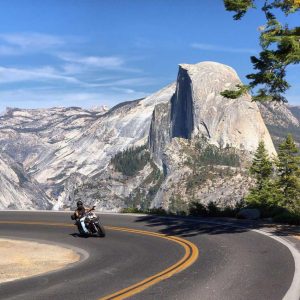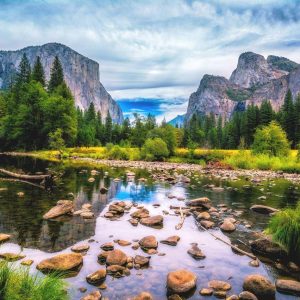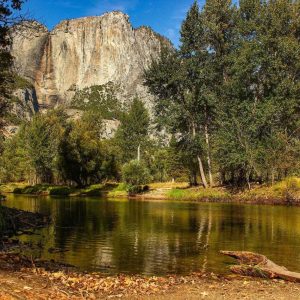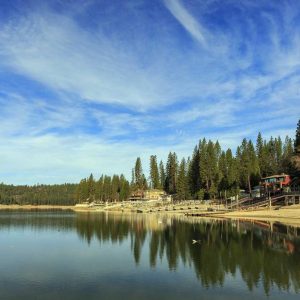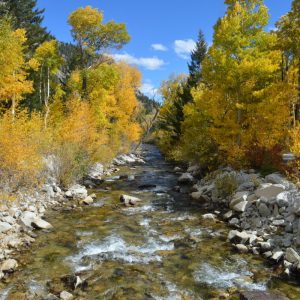 The Canadian Rocky Mountains are arguably best seen via Jasper National Park. With the charming town of Jasper as your home base and a variety of lodging options, you can spend your evenings indulging in delectable dishes and a comfortable bed while filling your days with outdoor adventures. No matter what time of year you visit, there are many ways to enjoy Jasper’s magic. Here are the 13 best things to do in Jasper, Alberta, Canada.
The Canadian Rocky Mountains are arguably best seen via Jasper National Park. With the charming town of Jasper as your home base and a variety of lodging options, you can spend your evenings indulging in delectable dishes and a comfortable bed while filling your days with outdoor adventures. No matter what time of year you visit, there are many ways to enjoy Jasper’s magic. Here are the 13 best things to do in Jasper, Alberta, Canada.
Contents
- 1. Tour The Cool Columbia Icefield
- 2. Soak It All In At Miette Hot Springs
- 3. Go Hiking In Jasper National Park
- 4. See Some Glaciers At Mount Edith Cavell
- 5. Enjoy The Majesty Of Athabasca Falls
- 6. Travel Via Dogsled
- 7. Go White Water Rafting On The Athabasca River
- 8. Take An Ice Walk In Maligne Canyon
- 9. Ride The Jaunty Jasper SkyTram
- 10. Do Some Stargazing In Jasper National Park’s Dark Sky Preserve
- 11. Go On A Wonderful Wildlife Tour
- 12. Snowboard Or Ski At Marmot Basin
- 13. Do Some Cross-Country Skiing Through Jasper National Park
13 Best Things to Do in Jasper, Alberta, Canada
1. Tour The Cool Columbia Icefield

Adventurers frequently travel to the Columbia Icefield for their adventures. The Columbia Icefield is a singular experience that gives guests the chance to explore one of Canada’s most stunning natural wonders. It’s also a great location to go to with family and friends.
A trip along the Icefields Parkway, a stop at Athabasca Falls, and a trip on the Ice Explorer into the Athabasca Glacier are all included in the tour. The Skywalk is another option to check out for breathtaking views. It is also important to keep in mind that the tour is only offered from spring to fall if you’re seriously thinking about going. Wear warm clothing, and bring sturdy shoes.
2. Soak It All In At Miette Hot Springs
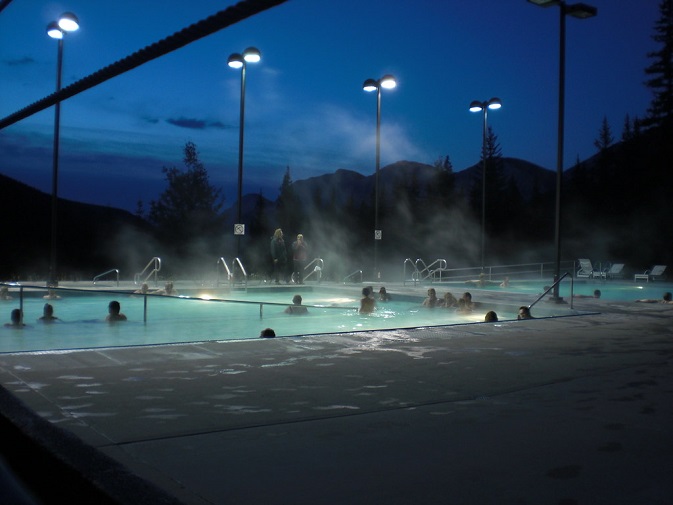
The Canadian Rockies’ hottest hot springs, Miette Hot Springs, are a wonderful place to unwind. The pools here are generally open from early May to mid-October, They are usually closed from late fall to early spring. There are lockers and showers on site, and the pool has excellent views.
Bring a pair of sandals or shower clogs with you. The water in the pools where bathers congregate is cooled from the hot springs’ initial scalding-hot 54 degrees Celsius to a more bearable, though still toasty, 40 degrees Celsius. If you want a hot-and-cold experience, there are a few different pool options to pick from, including a few that are extremely cold. In addition to the calming water, which is rich in sulfate, calcium, bicarbonate, magnesium, and sodium, the water and views together provide the best environment for real relaxation.
3. Go Hiking In Jasper National Park

There are countless hiking opportunities in Jasper National Park. Check out the scenic Bald Hills trail for a strenuous day hike that offers views of Maligne Lake. This hike, which is 10.4 kilometers long and gains 700 meters in elevation, takes four to six hours to complete. The 44-kilometer Skyline Trail is a must-do for multi-day hikers; depending on how quickly you hike, it takes two to four days to complete. This hike has an elevation gain of 1,380 meters. Try the Wapiti trail if you’d rather keep things simple; at 9.4 kilometers and no elevation gain, it’s still quite a distance but will take you between two and four hours to complete. When the weather is warm and the trails are open, May to September is the ideal time to visit Jasper National Park.
4. See Some Glaciers At Mount Edith Cavell
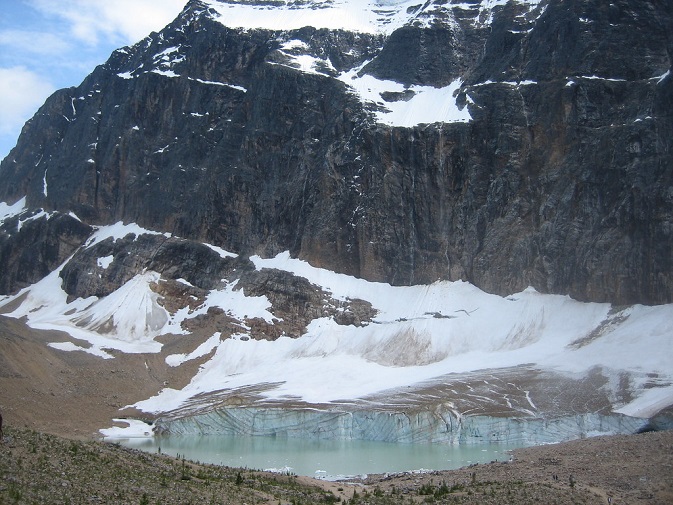
Mount Edith Cavell is one of the amazing sights near Jasper and a must-see when in town. It’s named after a nurse who helped treat wounded Allied soldiers during World War I. From Jasper, a winding, narrow road sharply ascends before dropping you off at a parking area close to the mountain’s base. Across a rocky, area, follow the 1.6-kilometer easy Glacier trail’s return path to reach Cavell Pond. Signs posted along the route describe the surroundings. Watch the rock piles; you might spot a cute pika going about their daily routine. You’ll eventually arrive at a number of viewpoints over the popular pond. You might see some icebergs that have fallen from the Angel Glacier, which is located above you. The best time to complete the hike is from June to September when the weather is warm and the road is open.
5. Enjoy The Majesty Of Athabasca Falls

The Columbia Ice Field is where the mighty Athabasca River begins its journey. It flows slowly until it reaches a ledge, where it plunges into a small chasm. This is where the seemingly harmless river reveals its true nature, roaring and boiling in an unchecked torrent that raises misty clouds.
Athabasca Falls, one of Canada’s best waterfalls, is 23 meters high and performs at its peak in the summer when snow melts from the mountains’ highest elevations. Fortunately, most visitors come during this time, and traveling is simple. You can feel the ground tremble under your feet as you walk along a short, relatively level trail that leads right up to the edge of the falls. Mind you, online travel experts confirm that the best time to visit the falls is specifically between June 1 and September 30 when the weather is usually warm.
6. Travel Via Dogsled

There are several businesses in the Jasper area that offer dog sledding tours. Each one covers various terrains and has different itineraries, but they all let you see Jasper while getting to know a pack of huskies. One of the first methods of winter transportation is reportedly dog sledding.
You’ll be surprised at how smooth the ride is and how much ground the dogs can cover when you’re nestled in the sled. The musher actually rides on the sled’s back and serves as a director of sorts for the dogs, telling them when to go faster or slower. Most of these tours give travelers the chance to practice pulling the sled. The length of the tours ranges from a quick hour-long trip to an overnight expedition where you stay in a log cabin out in the wilderness. Wintertime is the only time you can enjoy this activity so be sure to dress warmly.
7. Go White Water Rafting On The Athabasca River
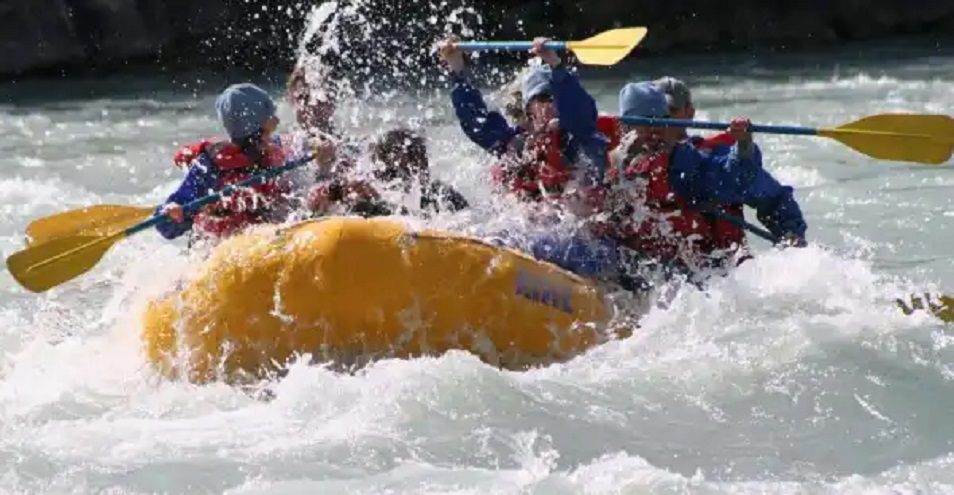
Regular readers should already know that enjoying a rafting trip down the beautiful Athabasca River in Jasper National Park does not require any prior whitewater rafting experience. Professional guides will teach you everything you will need to know to have a memorable, enjoyable float. Children as young as six years old can participate in beginner tours, which include Class 2 rapids, which are thrilling but still definitely doable. If you believe you’re too old to participate in this activity, think again! The senior set has even been reported hooting and hollering all the way down this river. This glacier-fed river is cold even though white water rafting runs from May to September. Life jackets, paddle jackets, neoprene booties, and wetsuits will all be provided by your outfitter to keep you warm and safe. All you need to bring is a bathing suit or clothing that you don’t mind getting wet.
8. Take An Ice Walk In Maligne Canyon
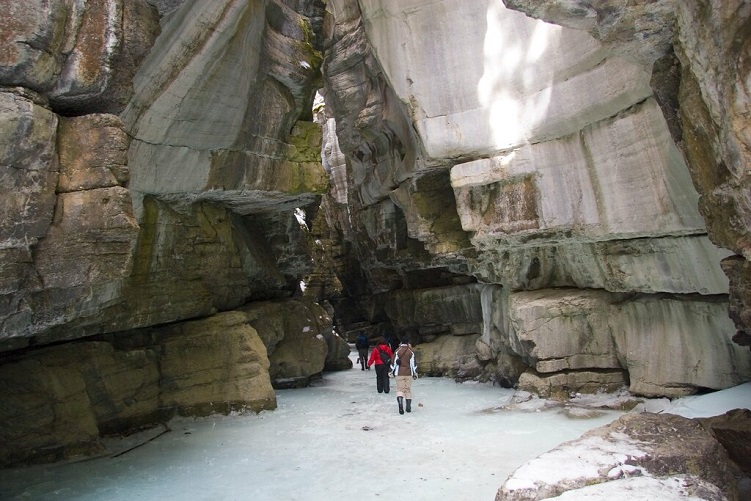
Explore Maligne Canyon when it freezes over in the winter. Dress warmly and wear ice cleats. See the frozen waterfalls, ice caves, and cool ice formations. You’ll venture deep into the canyon on the three-hour, 3.5-kilometer Maligne Canyon Ice Walk Tour, where you’ll have plenty of time to be awed by the ice. Participants should feel comfortable engaging in moderate physical activity because the route is mostly downhill and steep in places. Your tour guide will take the time to tell you about all the amazing details of Maligne Canyon and the Maligne Valley as you proceed through the tour. The majority of the snow gear needed by visitors must be brought by them, but the tour operator provides both ice cleats and helmet, as well as extra-warm winter boots to keep your feet warm.
9. Ride The Jaunty Jasper SkyTram

Take the Jasper SkyTram up to the top of Jasper National Park to fully appreciate the breathtaking views. Up to 26 passengers can ride this aerial tramway up 2,263 meters in 7.5 minutes. Once you reach the top, you can hike up to the top of Whistlers Mountain for even more breathtaking panoramas, stroll the boardwalks close to Upper Station if you want to keep it calm, or don snowshoes and go on a walking tour during the months other than the summer; rentals are offered on-site.
The full-service Summit Restaurant is a great place to go after you’ve worked up an appetite. Mid-March through late October/early November is when the SkyTram operates on a seasonal basis. Bring layers whenever you go because the weather is typically 12 degrees Celsius colder up top than it is in the city.
10. Do Some Stargazing In Jasper National Park’s Dark Sky Preserve
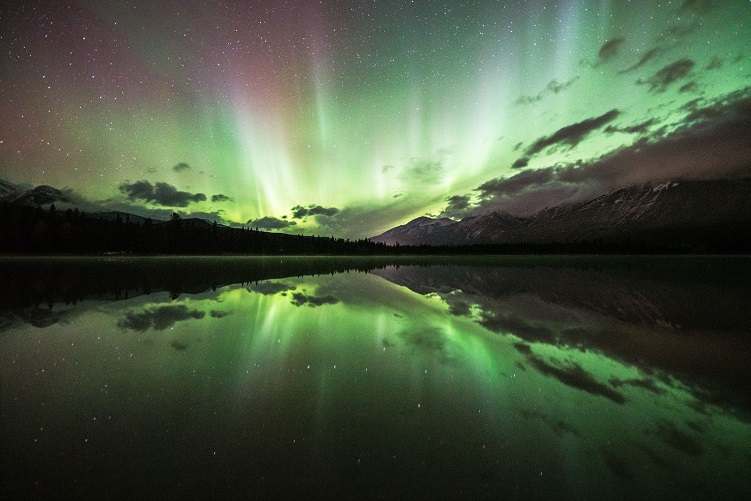
As an officially acknowledged Dark Sky Preserve, Jasper National Park consistently strives to significantly reduce the effects of light pollution. With 11,000 square kilometers, it’s the second-largest dark sky reserve in the world. The end result is a pitch-black sky with brilliant stars.
Even though you can enjoy the night sky all year long, the Jasper Dark Sky Festival happens in the middle to end of October each year. The festival features a symphony under the stars, workshops on night sky photography, moon viewing events, planetarium visits, and an impressive roster of scientific speakers. It should not be missed if you have a passion for the stars. Jasper National Park is also home to a variety of wildlife such as elk, moose, and bears. It is an exceptional place to visit if you are interested in a truly unforgettable experience.
11. Go On A Wonderful Wildlife Tour

On a Jasper evening guided wildlife tour, you might see animals like elk, mountain goats, black bears, and grizzly bears. Numerous animals, ranging in size from large (such as moose) to small (such as pika), live in the national park, and viewing wildlife in its natural setting is exhilarating and educational. The guides can give you a lot of information about the local animal population and know the best places to see sightings.
For the benefit of both you and the animal, they’ll give you instructions on how to observe wildlife safely. Because animals migrate and hibernate, different seasons offer different chances to see wildlife. Coyotes, wolves, moose, deer, and elk may be spotted during winter tours, while grizzly bears, mountain goats, and bighorn sheep may be seen during summer excursions. Tours are available all year. Remember to bring your camera!
12. Snowboard Or Ski At Marmot Basin
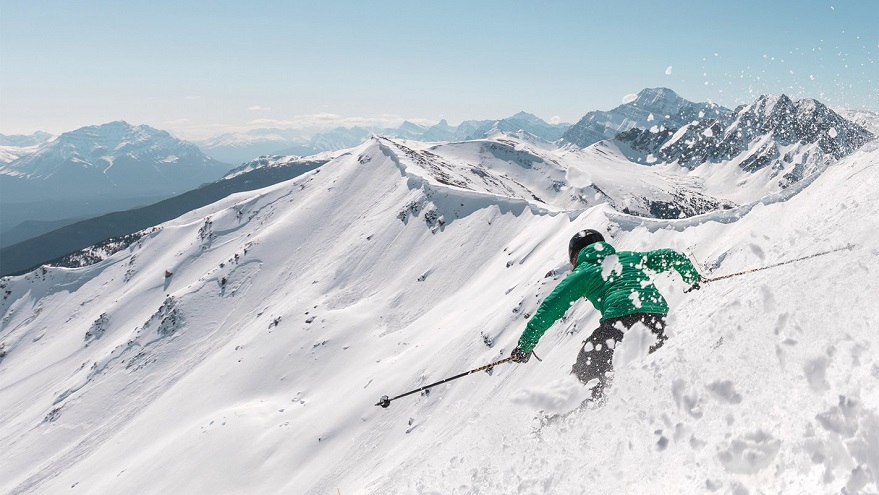
Marmot Basin has the highest base elevation of any ski resort in Canada, at 1,698 meters, which results in an abundance of new, powdery snow. One of Alberta’s top ski areas is only a short drive from the city, making it the ideal destination for a day trip. Spread across five distinct mountain faces, the mountain’s 1,702 acres of delightfully skiable terrain are available. Access to the mountain is made simple by seven ski lifts, which offer options for skiers of all abilities, from novice to expert. You can find it at Marmot whether you prefer to ski groomers, trees, bowls, or terrain parks. The ski season at Marmot Basin typically begins in mid-November and lasts until early May. Expect very chilly on-mountain conditions if you are going to visit between December and February. Dress warmly and take regular breaks inside.
13. Do Some Cross-Country Skiing Through Jasper National Park
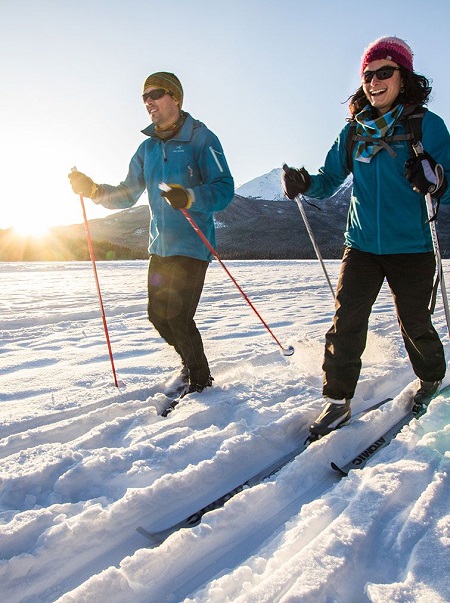
In Jasper National Park, there are five distinct cross-country ski areas with a range of terrain. Beginners will love Pyramid Mountain’s straightforward 4.4-kilometer loop with little elevation change, while experts can take on the 15-kilometer Pyramid Fire Road with its difficult 533-meter climb. Additional simple trails can be found at Pipeline Trail, Wabasso Campground, and Athabasca Falls. The Whirlpool Winter Hub has some excellent options for intermediate skiers.
If you do not have your own cross-country skis, you can rent a pair in town. Remember to layer up! Even though Jasper’s winters are chilly, it’s simple to get a good sweat going on the trails. There are many options available if you’re looking for a place to stay in the park. With suites designed for large families and breathtaking mountain views, Jasper Inn & Suites is a fantastic option for families.
